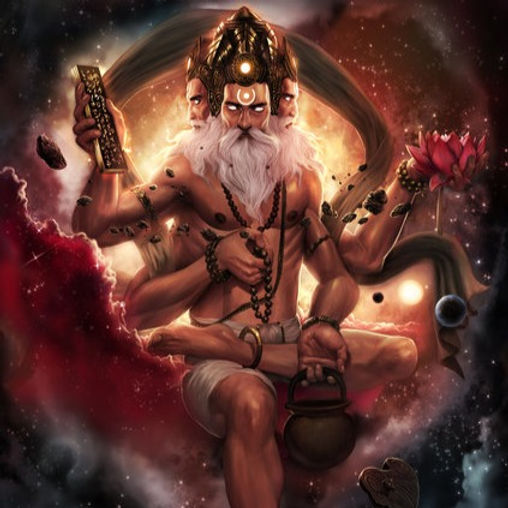Why There Is Only One Temple Of Lord Brahma?
Why There Is Only One Temple Of Lord Brahma
Introduction to Lord Brahma
In Hindu mythology, Lord Brahma is regarded as the divine architect of the universe. Brahma, along with the esteemed preserver, Lord Vishnu, and the powerful destroyer, Lord Shiva, is regarded as one of the most important triumvirates in the vast Hindu pantheon.
Despite his vital position in the magnificent tapestry of creation, it is interesting to see the lack of dedicated shrines to Lord Brahma across India. This unusual phenomena piques interest and encourages investigation into the enigmatic nature of Brahma worship amid the wide terrain of Hindu spirituality.
The Mythological Story Behind Lord Brahma
According to Hindu ancient writings, the glorious cosmos arose from Lord Brahma’s limitless reservoir of divine power. The imagery in these scriptures depicts Brahma seated on a brilliant lotus sprouting from the ethereal depths of Lord Vishnu’s navel, while the supreme god reclines upon the majestic snake deity, Shesha.
Within this magical scenario, Brahma takes on the awe-inspiring job of orchestrating the intricate dance of creation, weaving together the many elements that make up the very fabric of reality. The universe unfolds in all its astonishing complexity thanks to his divine agency, with each facet precisely designed and imbued with the spirit of Brahma’s limitless creativity and understanding.
Thus, the everlasting narrative of cosmic origin unfolds, with Brahma at the helm, steering the universe through the eternal cycles of birth, growth, and transformation.
Why Does Lord Brahma Have Only One Temple?
The scarcity of temples dedicated to Lord Brahma can be traced back to a fascinating legendary story that has captivated generations. According to tradition, Brahma, the universe’s creator, was fascinated by the exquisite beauty of Saraswati, the goddess of wisdom and knowledge who also happened to be his daughter. In his zeal, Brahma chased Saraswati, unconscious of the consequences of his deeds. Saraswati, furious and scared by her father’s advances, fled in all directions. However, captivated by his desire, Brahma produced numerous heads to keep his sight on her.
Brahma’s misdirected affection enraged Saraswati, who sought divine intervention to resolve the matter. Lord Shiva, the ultimate deity, intervened and, recognizing the enormity of Brahma’s violation, pronounced a penalty appropriate for the offense. As a result, Brahma was decreed to be worshipped only in one temple, serving as a sobering reminder of the dangers of unrestrained passions and the significance of maintaining moral purity in the holy domain. Thus, the story of Brahma’s solitary temple is both a cautionary tale and a monument to the intricacies of heavenly relationships in Hindu mythology.
The Sole Temple of Lord Brahma: Brahma Temple in Pushkar
The Brahma Temple in Pushkar is a timeless beacon of spiritual reverence and architectural magnificence. Nestled in the serene environs of the sacred town of Pushkar in Rajasthan, India, this famous temple is the only shrine devoted to Lord Brahma, the creator deity in Hindu mythology.
The Brahma Temple, built over 2,000 years ago, is a tribute to the lasting power of ancient workmanship and religious devotion. Its architectural design, which features elaborate carvings and bright colors, represents the region’s rich cultural legacy. The temple, located near the peaceful waters of Pushkar Lake, emanates a sense of serenity and holiness, attracting pilgrims and tourists from all over.
Devotees come to the Brahma Temple to pray and receive blessings for intelligence, creativity, and prosperity. The temple’s sanctum sanctorum contains a stunning idol of Lord Brahma, which is decked with flower gifts and incense, creating an aura of divine reverence and spiritual fulfillment.
The Brahma Temple in Pushkar, one of India’s most recognized pilgrimage sites, continues to captivate devotees’ hearts and minds, providing as a sacred haven for the faithful to connect with the divine and experience the timeless essence of Lord Brahma’s kindness and grace.
Significance of Worshiping Lord Brahma
Despite the scarcity of temples, Hindus place great spiritual value on worshiping Lord Brahma. Devotees believe that seeking his blessings leads to increased creativity, knowledge, and success in all activities. Special prayers and rituals are offered in his honor, particularly during the auspicious festival of Kartik Purnima.
Conclusion
The unique existence of Brahma temples reveals the rich story of Lord Brahma in Hindu mythology. Despite his central role in creation, his devotion is limited to a single shrine, acting as a poignant reminder of the complexity inherent in religious tales. This scarcity promotes reflection on the nature of worship and challenges seekers to dive deeper into the essence of Brahma’s divine characteristics, promoting a more profound grasp of spiritual truths in the Hindu tradition.
Unique FAQs
- Why is Lord Brahma not worshiped widely compared to other Hindu deities?
- Lord Brahma’s limited worship can be attributed to the mythological curse placed upon him and the preference for other deities such as Vishnu and Shiva.
- What is the significance of Pushkar in relation to Lord Brahma?
- Pushkar is considered a sacred site associated with Lord Brahma, housing the only temple dedicated to him. The town holds immense religious importance for Hindus.
- Are there any other temples dedicated to Lord Brahma besides the one in Pushkar?
- While the Brahma Temple in Pushkar is the most famous, there are a few other temples dedicated to Lord Brahma scattered across India, albeit in smaller numbers.
- What are some rituals performed in honor of Lord Brahma?
- Devotees often perform special prayers and rituals, including recitation of mantras and offering of flowers and fruits, to seek Lord Brahma’s blessings for creativity, knowledge, and success.
- Is the Brahma Temple in Pushkar open to visitors of all faiths?
- Yes, the Brahma Temple in Pushkar welcomes visitors of all faiths to experience its spiritual ambiance and architectural beauty.

